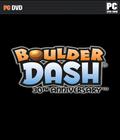Released in 1984, Boulder Dash centered on collecting stuff within a time limit and clearing out levels of precious gems before the timer expired. The formula was simple, but the maze designs and various hazards made the experience both difficult and fun. The game was fun enough to spawn several sequels and different incarnations on different platforms. Boulder Dash: 30th Anniversary Edition is an odd beast in that not only is it two years too late for the actual anniversary, but it is a port to a free-to-play mobile title of the same name. The move from free to a premium title that still charges for some DLC stages can rub one the wrong way, and if the game were to be judged by that metric alone, it would be terrible. Looking at it solely from a gameplay perspective, however, shows a core game that is still enticing but not as flawless as some remember the original to be.
Much like the original title, there's no need for a narrative, save for the fact that your name is Rockford. The goal in each stage is to dig through the earth in any cardinal direction and amass enough gems to open up the exit. While this is easy to accomplish, you're challenged to get a higher score and a maximum of a three-star ranking if you find all of the gems in the stage. The caveat is that you're timed, so there needs to be a balance between gem collection and having enough time to make your escape.
Time is just one of the hazards you'll face in Boulder Dash. Gravity is another foe, as rocks fall when there's no ground beneath them. They don't just fall straight down, either; they have a tendency to fall left or right, depending on the situation. Creatures like dragons, fireflies and moths can take you down with one blow, though they have predictable patterns. Then there's the amoeba, a creature that won't kill you outright via touch but eats up available space with its mass. You can try to halt its movement, but doing so simply makes it explode into rocks or gems.
You have tools by your side to help you out. Dynamite is good for destroying rocks and earth — as well as any enemies that happen to be caught in its explosion. The magnifying glass gives you a 10-second bonus, but its most important function is letting you pan the camera, so you can see the whole level and plan your route to the exit. You can freeze time for a few seconds, and you also have the chance to power yourself up so that any gems you pick up are worth double their normal point count. Beyond this, uncovering treasure chests in each level gives you items that can be used to unlock more characters, and each character comes with special abilities, like faster speed or the inert ability to score more points for each gem collected.
Boulder Dash falls squarely in the saying, "easy to learn, hard to master." Except for the face buttons that correspond to your tools, the controls are easy to figure out, and the goal is straightforward enough that you don't need a tutorial. The game even makes it easy for you to open the exit without working too hard to find the necessary gems — though pathways to the exit can become rather convoluted later. It doesn't take long for the levels to start exhibiting devious layouts, such as rocks that trap you and gems that hide in hard-to-reach places. It challenges you, but it at least has the courtesy to ramp things up enough that you aren't suddenly hit with an impossible stage.
Complementing the large number of stages available in the base package is the ability to create your own levels. The level creation system is easy to use, and it doesn't take too much effort to make your own stage. The rest of the community seems to agree, since there are plenty of stages available for download on Steam Workshop; they're a mix of original creations and homages to the older games. Be forewarned, though, that this section of the game has no controller support, so you'll need a keyboard and mouse nearby if you're playing in the living room.
Although the game does so many things right, it does falter in a few spots. The controls feel a bit off with a controller. The game still obeys the old rules of movement (one tile at a time), but you often feel like the movement is loose since correspondence isn't an exact 1:1 with your stick. It feels more precise on the keyboard. Also, the price seems steep. There's the expected sting of paying for what is essentially a free game on phones, and $15 is quite a bit compared to what you see for other ported mobile games, especially those without reworked interfaces. The high price doesn't include 2 DLC packs, and that stings even more.
Whether or not you can live with those aforementioned slights, the one that won't be so easily forgivable is the apparent grind the game relies on for a number of things. You'll be able to get some of the power-ups you need via the treasure chests randomly hidden in each world, but that rarely happens. Instead, you'll depend on gold to buy more power-ups and continue stages if you don't want to restart from the beginning. The only way to earn gold is by getting two- or three-star ranks per level, and even then, the reward for doing so is pretty paltry (two bars). Each power-up costs at least 25 gold, and continues are variable depending on the stage you're in. With those power-ups being almost essential in later levels and the scarcity of available funds to buy them, you'll return to old levels several times in hopes of getting lucky and getting what you need to finally move forward. Considering how often this can occur, you'll revisit those old stages more often than you'd like.
You can argue that we've seen other mobile games come over to the PC and consoles with the grinding intact. While this is true, it is the approach that is vexing. In titles like Pac-Man 256, which was also free on phones, the game compensated for the lack of microtransactions and ad rewards with coin package rewards that were given out rather often. You still had to work to get what you needed to gain new powers and level up, but the grind was somewhat mitigated by replacing what was missing by going premium.
You don't see this at all with Boulder Dash. There are no daily rewards and no way to buy new gold so you can get power-ups, but the payout for normal gameplay remains the same. Because you're not gaining more gold through normal gameplay and you have no way of obtaining more through any other means, the game becomes a slog. You have to go through old levels multiple times and hope that random chance gives you what you need to move on. It can be enough to suck the fun out for some people, and it serves as a lesson for those wanting to put their mobile games on a home platform to rebalance the game for that audience.
The presentation is curious. The square designs on the characters are fine, but the backgrounds you play in all look rather flat. Whether it's the lack of particles or the bland color scheme, nothing here pops out at you, and the animations for falling objects don't look convincing, either. As for the sound, the mix is also completely off. Sound effects are basic enough but are loud enough to pierce the ear at low volumes. The music, however, is drowned out so much that you'll be forgiven for thinking it doesn't even exist.
Overall, Boulder Dash: 30th Anniversary Edition is a flawed but fun experience. The base game still runs on a good formula, the challenge is great, and the curve isn't too punishing. The addition of power-ups changes things up a bit, and level creation is a nice addition to a game that's already packed with over 200 stages. However, the presentation feels flat, and the grind can be enough of a deterrent for those wanting to actually complete the game. It's worth checking out, but mostly if you can wait for a sale on it.
Score: 6.5/10
More articles about Boulder Dash: 30th Anniversary











 Boulder Dash is a fantastic return to form for the beloved "Dig Dug"-style underground action game as you dig tunnels to avoid (or trap) your foes while scoring rock-crushing combos!
Boulder Dash is a fantastic return to form for the beloved "Dig Dug"-style underground action game as you dig tunnels to avoid (or trap) your foes while scoring rock-crushing combos!












